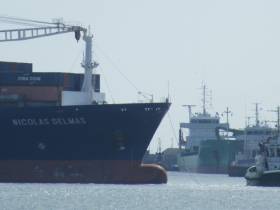Displaying items by tag: Key Management Positions
IMDO Announces New Appointments to Key Management Positions
#IMDOappointments - The Irish Maritime Development Office (IMDO) announcement of two new appointments to key management positions has been welcomed here on Afloat.ie, which offers the only regular ports & shipping coverage.
Dr Edel O’Connor joins the IMDO as Business Development Manager and Kelli O’Malley as Marketing & Communications Manager. Their appointments to the organisations management team were made in recent weeks. The government agency is responsible in providing dedicated support to national and international maritime business sector in Ireland.
Dr Edel O'Connor, Business Development Manager, IMDO
Edel holds a doctorate in computer science from DCU and recently received a Diploma in Management from the Irish Management Institute. Over the past number of years, Edel has led the strategic development and implementation of the national marine technology programme and associated SmartOcean initiative. This programme has worked to ‘marinise’ Ireland’s existing strengths across ICT and engineering to drive innovation in new areas of the blue economy.
In this role, Edel spearheaded a number of highly successful events promoting Ireland's digital ocean opportunity and enabling technology companies to drive new forms of innovation in marine using Ireland as a test-bed. Edel also led the development of international partnerships across research and industry, supporting the growth of Ireland’s reputation as an attractive place to do business in this sector. Edel has also been closely involved with the strategic development of actions associated with Harnessing Our Ocean Wealth, and in particular supported the work of the Development Task Force.
Kelli O'Malley, Marketing & Communications Manager, IMDO
Kelli has responsibility for the planning and implementation of the IMDO’s marketing and communications activities both in Ireland and abroad.
Similar roles were held by Keli with the Institute of Directors in Ireland, Chambers Ireland and various PR agencies. Kelli holds an M.A. in Public Relations from Dublin Institute of Technology, a B.A. in English & Economics from UCD and a Certificate in Public Affairs from the Public Relations Institute of Ireland (PRII).
Commenting on the new appointments, Liam Lacey, Director of the IMDO, said: “I am delighted to welcome Dr Edel O’Connor and Kelli O’Malley to the IMDO team. The knowledge, experience and expertise that Edel and Kelli bring to the organisation further strengthens our position to provide top class support to national and international maritime businesses based in Ireland and those considering doing business here. I very much look forward to working with Edel and Kelli in continuing to achieve our aim of being the focal point for maritime business in Ireland.”





























































